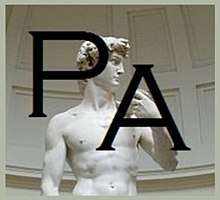Public Art in Public Places
Public Art in Public Places is a not-for-profit arts organization that encourages appreciation of public art by providing information on thousands of public artworks in Southern California and Hawaii.[1] The Public Art in Public Places Project was one of the first non-government national efforts to create a comprehensive online database of public art information as a free public resource. Public Art in Public Places is also notable for its geographic web mapping of public artworks[2] and for its online high-definition multi-media public art exhibits.[3] The organization also publishes editorial articles on public art topics, public art programs and events, and notable public artworks.[4]
 | |
| Established | 2006 |
|---|---|
| Location | California, United States |
| Type | Arts Organization/Online Data Archive |
| Director | K. M. Williamson |
| Website | http://www.publicartinpublicplaces.info/ |
History
Established as the Public Art in Public Places Project in 2006 by its current director K. M. Williamson, Ph.D., its programs disseminate public art data in support of its mission to promote actual experiences with public art[5] which thereby enrich civic engagement and public life.[6] The organization's collaborations with local governments, news media, on-line technology firms, and arts and cultural organizations support the development of its extensive data archives.
In 2009 Public Art in Public Places began contributions of geographic web mapping data to Google Maps. By 2017 the organization was a primary point-of-interest data contributor, and standardized the public art listing format via the creation and editing of public art location listings[7] in the Southern California region, Hawaii, and throughout the United States.
Google Cultural Institute
Public Art in Public Places became a Google Cultural Institute partner in 2016.[8] Through this partnership Public Art in Public Places publicizes online high-resolution and multi-media public art images and exhibits utilizing the Google Arts & Culture platform's digital technology.
Online Public Art Archives
Public Art in Public Places publishes a free and accessible online data archives on existing public artworks throughout Southern California and Hawaii in the United States. Organized by city, the archives contain official descriptive, visual and location data on several thousand permanent (not temporary) public artworks, including sculptures, murals, statues, and transit station art, as well as monuments, landmarks, memorials, and tourist attractions that contain public art features or components.[9] The archives are actively maintained and edited.
References
- Alderton, Bryce (July 14, 2016). "The mystery of 'Passport,' a 28-foot tall sculpture disappears". Los Angeles Times. Retrieved November 26, 2018.
- "Public Art :: P.O.I. Google Maps Features". Public Art in Public Places. Retrieved November 26, 2018.
- "Public Art in Public Places: Exhibits". Google Arts & Culture. 2016. Retrieved November 26, 2018.
- Williamson, K. M. (August 15, 2014). "August is Art Appreciation Month. What if it was also Public Space Planning Appreciation Month?". APA LA (American Planning Association, Los Angeles). REIMAGINE L.A. Retrieved November 23, 2018.
- "Project Mission". Public Art in Public Places. Retrieved October 17, 2018.
- DeShazo, Jessica L.; Smith, Zachary, eds. (2015). Developing Civic Engagement in Urban Public Art Programs. New York: Rowman & Littlefield. ISBN 978-1-4422-5728-3.
- "Urban Light". Google Maps. Retrieved November 26, 2018.
- "Google Arts & Culture - Public Art in Public Places". Google Arts & Culture. Retrieved September 26, 2018.
- Walsh, Daniella (June 28, 2016). "Mystery Surrounds Pastorius Sculpture". The Indy, Laguna Beach Independent Newspaper. Retrieved November 26, 2018.
Further reading
Arenson, Adam. Banking on Beauty: Millard Sheets and Midcentury Commercial Architecture in California. University of Texas Press, 2018.
DeShazo, Jessica L., and Zachary Smith. Developing Civic Engagement in Urban Public Art Programs. Rowman & Littlefield, 2015.
Fleming, Ronald Lee. The Art of Placemaking: Interpreting Community through Public Art and Urban Design. Merrill Publishing, 2007.
Knight, Cher Krause. Public Art: Theory, Practice and Populism. Blackwell Publishing, 2008.
Lofland, Lyn H. The Public Realm: Exploring the City's Quintessential Social Territory. Aldine de Gruyter, 1998.
Piechocki, Renee. "Beyond the Ribbon Cutting: Education and Programming Strategies for Public Art Projects and Programs." In Public Art by the Book, edited by Barbara Goldstein, 192-209. University of Washington Press, 2005.
Senie, Harriet. "Reframing Public Art: Audience Use, Interpretation, and Appreciation." In Art and Its Publics: Museum Studies at the Millennium, edited by Andrew McClellan, 185-200. Blackwell, 2003.
Wilson, James Q., and George L. Kelling. "Broken Windows: The Police and Neighborhood Safety." Atlantic Monthly, 29-38, 1982.